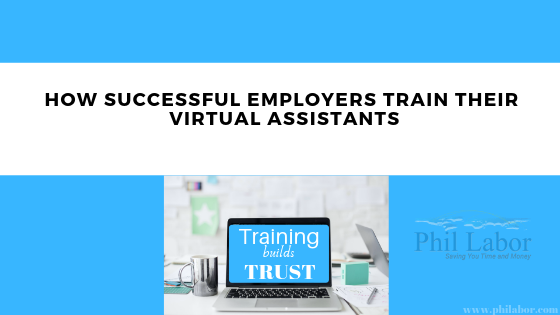Giving your Virtual Assistants quality training can build the TRUST you need. Filipino VA and other VA are hesitant to do things you haven’t specifically instructed them to do. Or, if you ask them to do something but don’t give them training, they worry they’re going to do it wrong and disappoint you.
On this article, Carl John Fechner discussed How successful Employers train their VAs.
 Training is crucial to a successful relationship with your virtual assistants. You wouldn’t expect an Australian employee to just walk in and get started, and you won’t be able to do that with a virtual assistant either.
Training is crucial to a successful relationship with your virtual assistants. You wouldn’t expect an Australian employee to just walk in and get started, and you won’t be able to do that with a virtual assistant either.
Training builds trust
 When you make the effort to create a training program for your VA, it shows that you care about them. You’re invested in their progress and want to see them do well in their career. You’re also demonstrating that they can come to you when they’re confused or need help.
When you make the effort to create a training program for your VA, it shows that you care about them. You’re invested in their progress and want to see them do well in their career. You’re also demonstrating that they can come to you when they’re confused or need help.
The training processes
help build a relationship between you and your VA. When you just hand over the tasks to be done without any training, it can be harmful in several ways. The obvious effect is that they won’t know how to do it properly. Your VA isn’t psychic and might not have any experience in the Aussie way of doing things. Take the time to show them how it’s done.
Remote work can be a lonely job. There’s no one to chat with, no water cooler conversations. If you do the internet equivalent of just throwing the work at them, your VA might start to feel like a slave toiling away in a lightless dungeon, without appreciation or guidance. They’ll probably quit as soon as they get a better offer.
It’s all about relationship
 A virtual business relationship means that you need to take a little extra care and time to communicate with your virtual staffers. Remember that your VA is a human being and show them the consideration that one person should show another. That way you will earn their trust and loyalty, which will help build your relationship over the long haul.
A virtual business relationship means that you need to take a little extra care and time to communicate with your virtual staffers. Remember that your VA is a human being and show them the consideration that one person should show another. That way you will earn their trust and loyalty, which will help build your relationship over the long haul.
How to set up your training program
 It helps to have a general training agenda set up that you can use for all your staff. Once you know the steps you can just slot in the specific requirements you need from each person.
It helps to have a general training agenda set up that you can use for all your staff. Once you know the steps you can just slot in the specific requirements you need from each person.
Use videos
Videos are a great way for your staff to get to know you. They’ll be able to see your face and hear your voice. You can record videos detailing the steps for all the projects you give your VA. Using a screen capture program, you can take recordings of everything that needs to be done, making it simple and easy for your VA to understand.
List step-by-step instructions
It’s better to over-communicate than under-communicate. Break tasks down into simple steps (with screenshots) and then list those steps using simple words. Spell out your objectives. There might be a bit of a language barrier, especially at the beginning. Make sure your VA has a very clear understanding of what is required.
When you assign the first few tasks to a new VA it can be a good idea to have a Skype or voice call with them. Look and listen for signs of hesitancy in their voice or body language. Make sure your new staffer understands that they can always come to you for help and clarification.
Use project management and file storage systems
You will be exchanging a lot of links and files with your remote workers. Choose a project management website such as Basecamp or Trello to keep it all organized. It will make your life much easier. No more figuring out who has the latest version of the file for the project you’re all working on. Simply log into your virtual room and see what’s going on.
For file management, you can use Google Docs, which allows you to do all your work in the cloud. Dropbox allows everyone to access files, instead of waiting for someone to send it to you.
Whichever system you decide on, train your virtual staff in how to use it properly. Usually, they’re quite easy and intuitive to learn.
Webinars
The World Wide Web has a wide selection of webinars for anything and everything. You don’t have to design your own training materials – just have a hunt around the Web and you can probably find something in your area of interest. There are plenty of webinars on how to use Basecamp or Trello, for instance.
All the time and effort you spend in training your VA will repay you tenfold. After all, wouldn’t you rather teach your staff how to do something right the first time, rather than play catch up trying to fix problems when they appear? Investing time into your virtual assistant will also repay you in loyalty, which is good business and good karma.
Need some help training your virtual assistant? I’ve done a lot of work with virtual staff and would be happy to share my experience. Please don’t hesitate to get in touch with any questions you might have. I’d be happy to hear from you!
This article was originally published by Carl John Fechner.
www.internetsecretsmadeeasy.com/outsourcing-changing-businesses/












































It works really well for me
I’ve been browsing online greater than 3 hours as of late, but I by no means
discovered any fascinating article like yours. It’s
lovely worth enough for me. In my opinion, if all webmasters and bloggers made
just right content as you probably did, the net
will be a lot more useful than ever before.